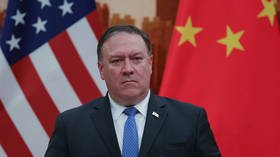China’s disqualification of pro-democracy lawmakers is a calculated bid to reduce US influence in Hong Kong
Beijing is exerting ever more control over Hong Kong, as seen with the disqualification of four legislative council members. With the US unlikely to respond firmly and the UK unable to, China has picked its moment well.
This week has seen a series of tumultuous events in Hong Kong. Just a day after the US state department imposed more sanctions on local officials, stating they were undermining the city’s autonomy under the ‘One Country, Two Systems’ arrangement, China’s National People’s Congress in Beijing passed a new law giving the region the right to disqualify members of the legislative council if they are deemed to have colluded with foreign forces, advocated for Hong Kong’s independence or sought to undermine national sovereignty in some way.
Immediately after the announcement, the authority instantly disqualified four legislators in the anti-Beijing camp, accusing them of having violated the relevant criteria. All remaining members of the legislature subsequently resigned en masse in protest at the decision, leaving the city without any elected opposition whatsoever.
The move is near certain to draw condemnation from the US and its allies, who accuse Beijing of undermining democracy in the former British colony and violating the Sino-British declaration following its handover in 1997.
The timing of the move is no coincidence. Although Mike Pompeo is still keen to confront China in the two months he has left as Secretary of State, the US election – which saw some fierce anti-Chinese rhetoric – is now over, and Beijing believes this is a gamble it can take and face few consequences for.
It aims to consolidate its sovereignty over the city and nullify the voices who have promoted foreign interference, and would argue that those who have been disqualified fall into this category. Beijing believes national loyalty should come first; it isn’t solely a question of democracy or not. Of course, critics will now see Hong Kong’s legislature as a ‘rubber stamp’ parliament without any opposition.
The western media portray the situation in Hong Kong as a simple choice between good and evil, authoritarian and malign Beijing up against the noble and virtuous pro-democracy camp. But that isn’t the Chinese view. Those on the mainland see the city as rightfully Chinese territory, which was taken away by the force of the British Empire and colonized. Its eventual return to China was subsequently interpreted as the correction of a historical injustice that had imposed humiliation on the country.
Irrespective of the democracy question, who Hong Kong ‘belongs to’ was never going to be up for debate ever again, thus formulating a view that Chinese sovereignty over it should be ‘protected’.
However, many in the city disagree. Hong Kong’s long-term separation from China and British colonial rule harboured the existence of a localist identity that still sees itself as different to the mainland. Since 1997, it has struggled to come to terms with its existence as part of China.
Also on rt.com Hong Kong opposition lawmakers resign en masse after 4 colleagues expelled from city’s parliamentThis localist identity has expressed itself through a demand for exclusivity upheld through local democracy and a continuation of its autonomy. Many young people in the city reject affiliation with China, and it is this dynamic which clashes with the mainland view, sowing the seeds of a political and identity-based conflict which has ravaged the city since last year.
Beijing sees this movement as a threat to its own sovereignty over the area, especially as many leading voices in the city have turned to foreign forces such as the US to consolidate their position.
Here lies the legislative council’s problem. The city’s mini-constitution had long mandated the ‘national security law’ to deal with the likes of treason and foreign collusion, but the role of democratic lawmakers and protesters made it politically untenable. This created a legal loophole which allowed the region to become a vehicle for the US to stake its influence there. But in June, Beijing implemented the law on behalf of the region, with it being constitutionally subject to the will of the National People’s Congress.
The application of the law has since ended the protest movement in Hong Kong. But Beijing wasn’t finished yet. With the hysteria of the US election over, Beijing has now seized its moment to deal with the last ‘troublesome’ individuals present within the council via a means of disqualification.
The charges of foreign collusion are not false or trumped up. One of those disqualified, Alvin Yeung, has traveled to the US and asked for sanctions to be implemented on Hong Kong. Such an act with a hostile country would be instantly career ending if done by a member of the US Congress or the UK’s House of Commons.
However, that isn’t going to stop critics stating the city’s opposition has in fact been nullified. The move will draw condemnation from a number of parties, but Beijing doesn’t feel particularly threatened by that. Pompeo may sanction a few more officials, but ultimately the US has tried to avoid imposing any financial sanctions on the city for the repercussions such a move might bring. And the UK is in such a state of political and economic disarray due to its second Covid lockdown, it hasn’t got the strength to take on Beijing.
Given that, this move is not a ‘tit-for-tat’ reaction to the US state department’s announcement yesterday. Rather, it is part of a well calibrated strategy to seize the moment to consolidate Chinese sovereignty over Hong Kong. It might well pay off.
Think your friends would be interested? Share this story!
The statements, views and opinions expressed in this column are solely those of the author and do not necessarily represent those of RT.















